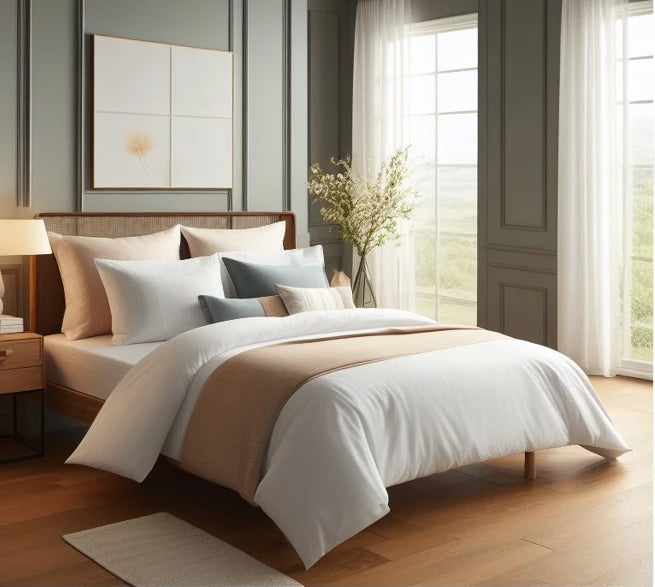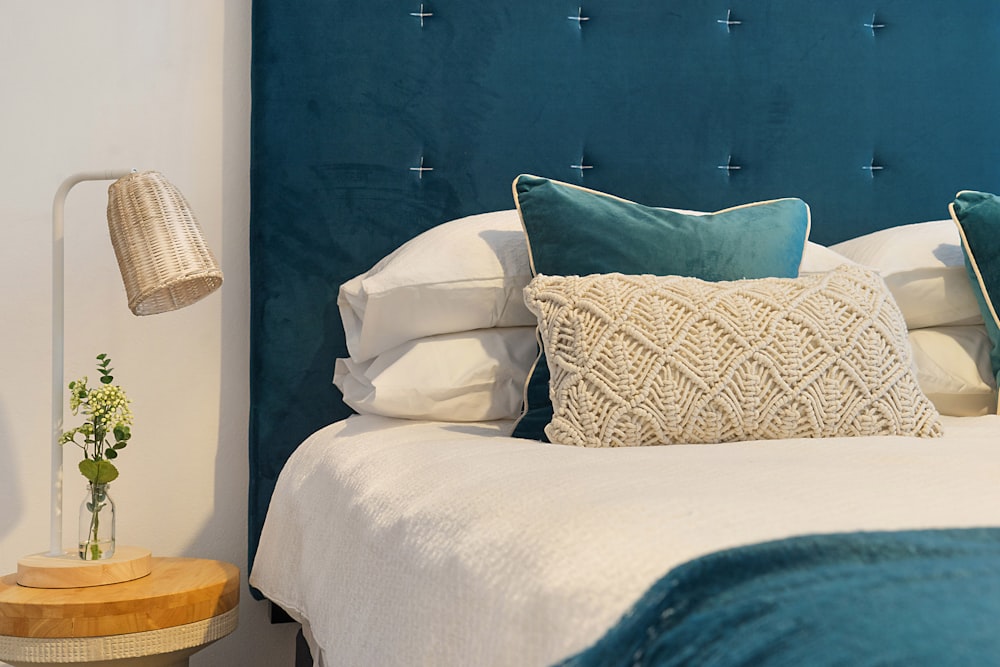Ever felt overwhelmed by the endless options when it comes to bed sheets? You're not alone! There’s been an influx of different types of bedsheets, especially microfiber bedsheets. Today, when you search for bedsheets on any online marketplace in India, you are flooded with manufacturers selling microfiber bedsheets so much so that customers are buying these bedsheets without knowing what they exactly are. Ever wondered what exactly is a microfiber bed sheet and if you should change your cotton bed sheets with a microfiber bedding?
Both offer comfort and promise a good night's sleep, but they have distinct personalities. In this blog, we will look into the differences of these bed sheets, help you decipher the pros and cons of each material so you can pick the perfect match for your sleep style and preferences.
What are microfiber bed sheets?
What is Microfiber?
Microfiber refers to fabrics made from extremely fine synthetic fibers, much thinner than human hair. These fibers are typically polyester or nylon, sometimes blended together. The thinness of the fibres gives microfiber its special properties: it's very soft, lightweight, and often quite good at absorbing moisture. This makes it a popular choice for cleaning clothes, athletic wear, and even some bed sheets.
Is microfiber good for bed sheets?
Microfiber can be a good option for bed sheets because of its unique properties. It is made from ultra-fine synthetic fibers. It offers a very smooth and soft feeling to the skin. Microfiber is also durable ensuring that the bed sheets made from it do not require too much maintenance and care. However, microfiber is not good for the environment and has low breathability compared to natural fibres like cotton. Microfiber can provide comfort and durability but it also has some drawbacks like it low breathability and evironmental impact.
What are Microfiber bed sheets?
Microfiber bed sheets are bedsheets made from super-thin strands of polyester, nylon, or blended synthetic materials. These strands are much finer than human hair. These bed sheets are known for being lightweight and fine. Microfiber sheets are also wrinkle-resistant, making them a low-maintenance bedding option. However, they are not as breathable as natural fibers like cotton, and some sleepers find them uncomfortable to sleep in at times.
What are the different articles that are made of Microfiber?
Microfiber finds its way into a surprising array of household items in India. From cleaning cloths and mops that trap dust and grime microfiber is a workhorse material. You'll also find it in furniture upholstery and even delicate items like eyeglass cloths that won't scratch your lenses.
Here's a breakdown of microfiber bed sheets:
- Material: Synthetic (usually polyester and/or nylon)
- Feel: Generally soft and smooth, with a slight sheen
- Durability: Can be quite durable and wrinkle-resistant
Issues of Microfiber bed sheets?
Microfiber bed sheets, while known for their softness and convenience, come with some drawbacks to consider:
- Breathability: They can trap heat more than natural fibres like cotton. This can be uncomfortable for hot sleepers who might experience night sweats.
- Static Cling: Microfiber's synthetic nature can lead to static cling, especially in dry climates. This can be annoying when sheets stick to your body or attract hair and lint.
- Highly absorbent: Microfiber is highly absorbent, making the bedsheets more prone to staining.
- Durability: While generally durable, microfiber sheets may not last as long as high-quality cotton sheets. Over time, they can lose their softness and develop a slightly worn texture.
- Environmental Impact: Microfiber is a petroleum-based synthetic material, and the production process can release harmful fumes. Additionally, these tiny fibres can shed and potentially make their way into waterways, raising environmental concerns.
- Allergy Concerns: For people with sensitive skin or allergies, microfiber sheets might trigger irritation. This is because they aren't naturally hypoallergenic like cotton.
Microfiber bed sheets good or bad?
When considering microfiber bed sheets, many people wonder if microfiber bed sheets good or bad. Microfiber bed sheets have gained a lot of popularity because of their softness and affordable prices. They offer multiple advantages like they are very durable and resistant to wrinkles which makes them very easy to maintain. But, there are some drawbacks of microfiber bed sheets. Microfiber bed sheets are made from synthetic materials which can trap heat and moisture, leading to discomfort and skin issues for people with sensitive skin. Additionally, the production of microfiber can have a negative environmental impact. Finally, whether microfiber bed sheets good or bad depends on personal preferences. For those who want soft and easy-to-maintain bed sheets then these can be a good option while others might want to invest in something more environmentally friendly and skin safe.
Also read our blog on How to fold a fitted bed sheet?
What is cotton?
Cotton is a soft, fluffy natural fiber that grows around the seeds of cotton plants. Cotton is a king amongst natural fibers in India, with a rich history dating back thousands of years. Prized for its breathability, softness, and durability, cotton is the most popular material for clothing and bedding. Cultivated across various regions in India, cotton provides valuable income for farmers and is a key material in the country's textile industry.
What are cotton bed sheets?
In India, cotton bed sheets reign supreme. The hot and humid climate makes cotton's natural breathability a top priority. These sheets allow air to circulate, keeping sleepers cool and comfortable throughout the night. Cotton's softness is another major advantage, providing a gentle touch against the skin. Plus, cotton is widely available in India, making it an affordable and sustainable choice. From crisp percale weaves to luxuriously soft sateen finishes, Belong’s luxury bed sheets offer a variety of options to suit individual preferences and budgets. No wonder they remain a staple in Indian bedrooms.
What are different articles made of cotton?
Cotton's versatility makes it a dominant fiber in Indian textiles. Beyond the ubiquitous bed sheets, cotton finds its way into countless everyday items. Cool and breathable kurtas and sarees are wardrobe staples, while cotton towels ensure comfort after a refreshing bath. In the kitchen, cotton dishcloths and napkins are workhorses, and for hot summer days, cotton lungis (sarongs) offer cool comfort. Even home furnishings like tablecloths, cushion covers, and throws often rely on cotton, creating a cool and inviting atmosphere in Indian homes.
Breakdown of cotton bed sheets:
Cotton bed sheets are a classic choice, made from the natural fibers of the cotton plant. These fibers are spun into yarn and then woven into sheets, offering a familiar and comfortable feel. Here's a closer look at cotton bed sheets:
- Material: Natural (cotton fibres)
- Feel: Soft, breathable, and can get softer over time with washing
- Breathability: Excellent, allowing for air circulation and keeping you cool
- Durability: Can be very durable, especially with proper care
- Moisture-wicking: Cotton absorbs moisture, which can be helpful for sweaty sleepers
- Cost: Can vary depending on the thread count and quality, but generally more affordable than high-end synthetic options
- Varieties: Cotton sheets come in a wide range of weaves (percale, sateen, flannel) that affect feel and warmth.

Difference between cotton bed sheets and microfiber bed sheets?
Choosing the perfect bed sheet is like picking your sleep partner– it needs to be comfortable, reliable, and match your personal preferences. Two popular options in the sheet world are cotton and microfiber, each offering distinct advantages. Let's break down their key differences to help you choose your champion for a good night's sleep.
Material:
- Cotton: A natural champion, cotton sheets are woven from the fibres of the cotton plant. This translates to a soft, breathable experience that gets even softer with washes.
- Microfiber: This is a synthetic fibre bed sheet, crafted from ultra-fine, man-made fibers (usually a polyester and/or nylon blend). They offer a smooth, sometimes slightly slippery feel.
- Cotton: The breathability of our cotton bed sheets is amazing. Its natural weave allows air to circulate freely, keeping you cool and comfortable throughout the night.
-
Microfiber: Breathability can be a mixed bag with microfiber. Tightly woven sheets can trap heat, while looser weaves offer better airflow.
Moisture Management:
- Cotton: Belong’s cotton bed sheets are absorbent, wicking away moisture and keeping you dry. This is ideal for sweaty sleepers.
-
Microfiber: Some microfiber sheets are good at wicking moisture but also high absorbent depending on the material and weave hence more prone to staining.
Temperature Regulation:
- Cotton: Cotton's breathability makes it a great choice for hot sleepers. It helps regulate body temperature and keeps you cool.
-
Microfiber: Microfiber bed sheets can be warm sleepers' kryptonite. While some are breathable, others can trap heat, especially those with a dense weave.
Durability and Care:
- Cotton: Our Cotton bed sheets are generally durable, especially with proper care. They might wrinkle more easily than microfiber sheets and require more frequent washing depending on how sweaty you sleep.
-
Microfiber: Microfiber bed sheets are often wrinkle-resistant and can be quite durable. However, they might pill (develop small balls of fabric) over time and require specific washing instructions.
Cost:
- Cotton: Generally affordable, with costs varying depending on thread count and quality.
-
Microfiber: Often a more budget-friendly option compared to high-end cotton sheets.
Ultimately, the best sheet depends on your sleep preferences.
- For hot sleepers: Cotton bed sheets breathability is hard to beat.
- For budget-conscious sleepers: Both cotton and microfiber bed sheets offer affordable options. Microfiber bedsheets tend to be cheaper than good quality cotton bedsheets.
-
For allergy sufferers: Cotton is a natural choice, often gentler on sensitive skin.
By understanding their strengths and weaknesses, you can choose the perfect bedsheet material to usher you into a peaceful slumber.
Also read our blog on how to decide size of your fitted bed sheets for my bed?
Why should you choose cotton over microfiber bed sheets?
If you crave a cool and comfortable night's sleep, cotton bed sheets might be your perfect match. Unlike microfiber, cotton is a natural material that breathes exceptionally well. This allows air to circulate freely, preventing you from feeling hot and sweaty throughout the night. Imagine tossing and turning in a stifling environment – cotton sheets can prevent that!
Belong’s cotton bed sheets also boasts other benefits. It's incredibly soft and gentle on the skin, making it ideal for those with allergies or sensitive skin. Plus, cotton sheets tend to get softer with every wash, unlike some microfiber sheets that might pill over time. So, for a breathable, comfortable, and long-lasting sleep experience, Belong india cotton sheets are a great choice! At Belong, quality matters - we want to bring you great products at good prices.
Finally, both cotton and microfiber sheets have their pros and cons. We explored breathability, warmth, price, and comfort to help you decide which sheet best suits your sleep style. Remember, the perfect sheet should feel like a cozy hug, not a stifling blanket. If you value a cool, natural, and gentle sleep experience, cotton bed sheets might be your dream come true. Sweet dreams!
FAQS
- I get really hot at night. Which bedsheet is cooler?
Cotton bedsheet is the clear winner here! Their natural breathability allows for better air circulation, keeping you cool and comfortable throughout the night.
- I'm on a tight budget. Are microfiber bedsheets a good option?
Microfiber sheets tend to be more affordable than high-quality cotton sheets. They can be an option due to budget-friendly choice, especially if you don't sleep hot. But investing in high quality cotton bed sheets is more beneficial in the long term, especially for durability and longer bedsheet life.
- I have sensitive skin. Which sheets are better?
Cotton sheets are gentler on sensitive skin due to their natural materials. They're less likely to cause irritation compared to some synthetic microfiber sheets.
- Do cotton bed sheets wrinkle easily?
Yes, cotton sheets are more prone to wrinkles than microfiber. However, ironing on low hear or using a wrinkle-release spray can help. The comfort and breathability of cotton often outweigh the wrinkling factor for many sleepers.
- How often should I wash my bed sheets?
Regardless of the material, it's recommended to wash your sheets once a week in warm water to remove sweat, dust mites, and allergens.
- Can I put my bed sheets in the dryer?
Both cotton and microfiber sheets can typically be tumble dried on low heat. However, always check the care label on your specific sheets for drying instructions.
- Are there any downsides to cotton bedsheets?
While cotton is a great choice for many, a good quality cotton bed sheet can be slightly more expensive than microfiber, and they might require more frequent washing depending on how sweaty you sleep.
Written by Shivangi Singh.
Sources:
References:
1. https://deohs.washington.edu/sites/default/files/images/microfiber_fact_sheet_11-21-11.pdf





